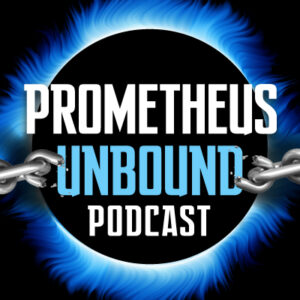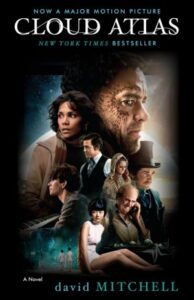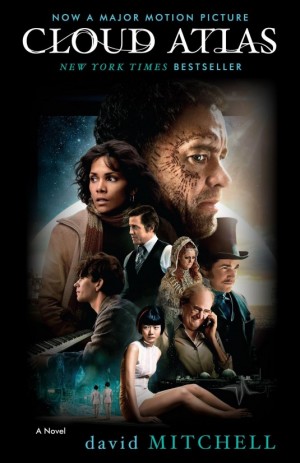
At long last, here is the first episode of our new, original podcast.
First, Matthew and I break the ice by briefly talking about what we've been reading recently. I had just finished Kameron Hurley's debut novel God's War. Overall, I think it's a good effort with an interesting story and world-building but is not without its flaws. Matthew had recently finished Live Free or Die by John Ringo. It was a 2011 Prometheus Award finalist, not a winner as I mistakenly thought while recording the podcast and, according to Matthew, didn't deserve to be.
Our interview with Stephan takes up most of the episode. It's around 53 minutes long and starts 9:40 minutes in. For those who don't already know him, Stephan Kinsella is a patent attorney and prominent libertarian legal scholar. He is best known for his opposition to intellectual property.
We invited Stephan on the show to discuss the problems of intellectual property and piracy in the Digital Age. But first we had to ask him about his love of science fiction and fantasy. We got him to mention some of his favorite authors and books (see below for a list), and we even talked about the Hobbit movie for a bit.
Then, at about 23:15 in, we dove into the meat of the interview. Stephan explained the historical origin of copyright (censorship) and patents (government grants of monopoly privilege, which is what copyright is now too really), how intellectual property has shaped and distorted the film and publishing industries, including Hollywood's move to California to avoid patent disputes, and why reform is not enough. We also discussed how the Digital Age — the age of the internet, smartphone, ereader, and globalization — is making the evils of copyright and patents more obvious and acute while at the same time undermining traditional business models built around intellectual property. And finally, we explore ways artistic creators might earn a living in a world without intellectual property laws.
[continue reading…]
Podcast: Play in new window | Download
Help Promote Prometheus Unbound by Sharing this Post


Cloud Atlas, a movie based on the novel of the same name, is a bundle of stories with interconnecting threads meant to form a greater pattern, a message to the viewer. We are all in this together, we conclude by the movie’s end. Sometimes we are nice to each other, and sometimes we are not, but either way our actions resonate into the future, even as they were partly shaped by actions from the past that resonated into the present. The filmmakers are successful in creating this pattern, but as a piece of entertainment and a storytelling vehicle, the movie itself achieves only limited success.
Each story of the larger tale is engaging by itself. That is, the scenario created is interesting enough and worthy of its own movie. The scenes are shot well, and thoughtfully, and the worlds, ranging from far in the past to far in the future, are imaginative conceptions where many other stories might take place. Given this format, it is difficult to summarize the film, which is just as well because watching it becomes more of an exercise in identifying themes and spotting parallels than in following a plot.
The cutting between stories is done in such a way as to prevent momentum from accruing. While I have read many good books that switched between multiple characters to good effect, these books had the characters as part of the same story, so that an advance in the plot of one character's story had immediate and important ramifications for the other characters, wherever they were in their story arcs. Each chapter usually had a beginning, middle, and end, as if it were its own short story, and finished with some sort of hook to make you regret leaving that character.
In Cloud Atlas, a character in one tale might compose music that another character hears decades later, but the connection is only important for the theme; it has no bearing on the obstacles to be overcome in the endeavor to reach a goal. With only a handful of exceptions, the characters in later times are not even aware of the ones who anteceded them. Imagine taking scenes from Amistad, Blade Runner, Star Wars, Miller's Crossing, and Three Days of the Condor and mixing them together into one film. As far as the plot goes, this is almost exactly how isolated each story is from the others, how little they have to do with one another.
[continue reading…]
Help Promote Prometheus Unbound by Sharing this Post

The new year has started off slow for us at Prometheus Unbound as we prepare some major new features and changes, but things are about to take off and I think 2013 is going to be an exciting one.
The Prometheus Unbound Podcast

We've been republishing some science-fiction-related episodes from the Mises Institute and Jeff Riggenbach's Libertarian Tradition podcast, but within the next couple of days we'll be launching our own original podcast. You've probably already listened to our promo for the podcast. We hope you like it and will help us promote the podcast by sharing it around to anyone you think might be interested in liberty and speculative fiction.
For our first episode, we have for you an interview with libertarian legal theorist and patent attorney Stephan Kinsella. If you're not familiar with Stephan and his work, you may be wondering why we interviewed a patent attorney. Well, Stephan is a leading figure in the movement against intellectual property. After talking about his favorite science fiction and fantasy novels, and the new Hobbit movie, we go on to discuss with him the history and origin of intellectual property; how copyright has shaped and distorted the publishing and film industries; how the internet, piracy, and advancing technology are undermining the intellectual property regime and the antiquated business models built on it; the rise of self-publishing; and more.
In our second episode, we'll be discussing libertarian speculative fiction. What qualifies a work of fiction as libertarian? What are the best, or our favorite, works of libertarian speculative fiction? Do libertarian authors tend to be too heavy-handed and preachy? Does the Prometheus Award to a good job of finding and promoting libertarian science fiction? Why are so many winners of the award written by authors who are not themselves libertarian? We'll seek to address these questions and more.
And in episode three, in February, we'll be interviewing Jeffrey Tucker, the editor of Laissez Faire Books.
Subscribe to our podcast-only rss feed to get episodes directly on your phone, tablet, or mp3 player: http://feeds.feedburner.com/prometheusunbound/podcast.
We hope you enjoy the show and will help us spread the word.
Site Redesign
I'm redesigning the site from the ground up on the new version 2.0 of the Thesis Theme Framework for WordPress. I think it will be much more slick, professional-looking, and powerful than the current design.
[continue reading…]
Help Promote Prometheus Unbound by Sharing this Post

Matthew and I recorded a brief promotional spot for the Prometheus Unbound Podcast. It includes part of the intro and outro that you will soon become familiar with as well as information about what listeners can expect from the podcast.
Join us as we
- interview your favorite authors, editors, and libertarian scholars;
- and discuss science fiction and fantasy in books, movies, and television.
You’ll enjoy segments like
- Book of the Month, in which we recommend a great book that ties in with that episode’s theme;
- Today’s Tomorrows Writing Prompt, where we take a current trend in society, explain its causes, and extrapolate how it will play out 10, 50, 100 years into the future;
- and Fiction Forecasts, in which we talk about upcoming books, movies, and tv shows, and predict our reactions.
As well as
- audio reviews;
- tips on writing, marketing. publishing, tools of the trade;
- and listener feedback that we read or play and respond to on the show.
[continue reading…]
Podcast: Play in new window | Download
Help Promote Prometheus Unbound by Sharing this Post




